
By Nakyia Taylor
Many groups and cities are seeing the effects of the global pandemic. The appearance and presence of the coronavirus have caused many changes to the American economy. As for women, who are already inflicted by gender pay gaps and work discrimination, the situation is much worse.
Women are often left to perform unpaid labor, which includes household chores and childcare. Coronavirus has caused many households to change their hygiene habits. This would increase daily unpaid labor and with children having to stay home.
According to Courtney Connely, CBNC Journalist, “Women spend 50% more time than men caring for families.”
Taking care of children and homes already affected women keeping their jobs. With the virus, women are having to choose between children and jobs.
“There are more expectations on women caring for children due to 33 states closing schools, which results in 64% of students having to stay home. The typical 241 minutes of unpaid labor a day is set to rise due to students having to stay home,” said Katica Roy, Gender Economist.
Staying home also impacts food insecurity. Some students are dependent on free meals from schools. Lack of nutrition and steady meals can cause detriment to health and immune systems. This would increase susceptibility to getting sick. Typically, those who are food insecure do not have healthcare.
“It is estimated that 30 million school-children will go without food. As a result, their immune systems could weaken,” said Roy.
Largely due to cultural norms and existing societal expectations, women are disadvantaged in keeping their jobs. Men are perceived as breadwinners and the sources of financial security, so women are more likely to be fired. This further increases the pay gap between men and women. It also holds a large effect on single parents and women without male partners.
“Women are more likely to take time off or get fired which compromises security because it is assumed that women have men to support them,” said Roy.
Women are also overrepresented in low-income jobs. Large portions of women’s income goes towards households. There is also the issue of losing a job while living in poverty.
“62% of minimum wage and lower-wage workers are female. They have a greater risk of income loss when workplaces are shut down. These jobs include hotels, airports, and restaurants,” said Roy.
Caregiving also mainly falls on women, whether it be when family members get sick or just the overwhelming number of females in healthcare and caregiving jobs. Currently, there is no vaccine and thus, little protection for health care workers.
“Women will be more likely to be exposed to the disease due to the tendency of caregiving duties falling on them,” said Elizabeth Ralph, the Deputy Editor for Politico.
Another issue is that of abortions. Access was already limited due to state laws and a limited number of clinics. Women aren’t able to travel to clinics because of stay-at-home mandates. This could lead to abortion delays, which can affect women’s health. Also, healthcare efforts are mainly going towards sick patients. Other patients are having to stay home for phone appointments and mailed healthcare.
The Coronavirus also doesn’t care if you have healthcare. Those in poverty are more susceptible due to poor sanitation systems and lack of access to healthcare.
“13 million women and 4.3 million children are currently without health care. This could impact both the sick and those in need of medical assistance,” said Roy.

